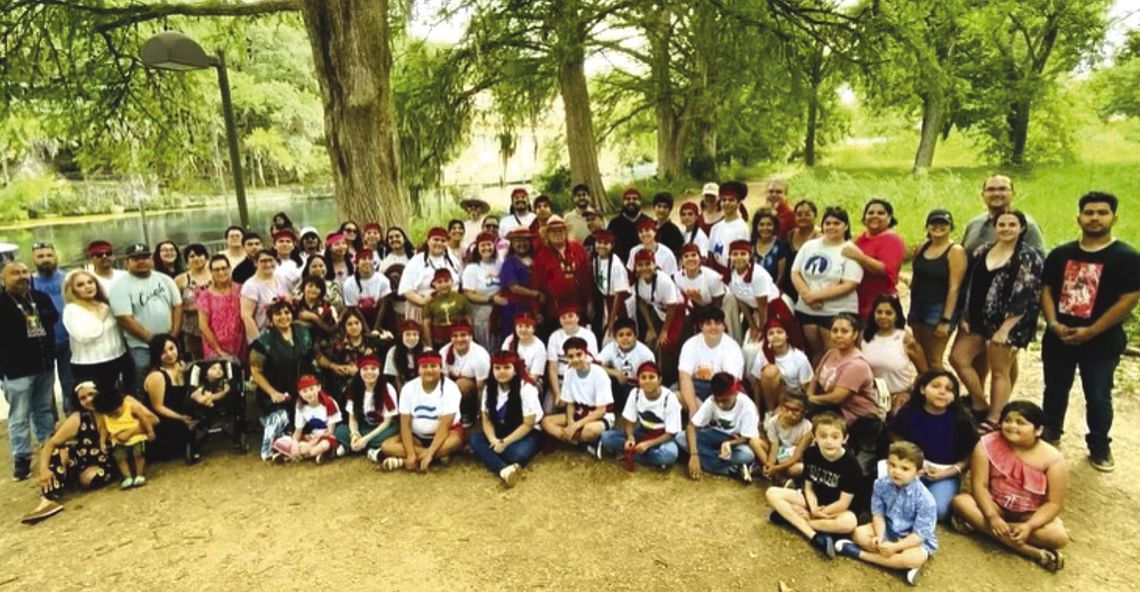The Indigenous Cultures Institute, based in San Marcos held its 11th Indigenous Arts Summer Encounter from June 19 - 24 at Cuauhtemoc Hall. The annual encounter brings together youth, artists and community members of San Marcos for a week-long ceremonial experience. Local students participated in daily activities that included the history, culture, arts and traditions of the indigenous people of our area. Students learned the creation story, about food justice and engaged in visual arts, music, dance, writing and cooking/nutrition activities that tied into teachings of indigenous foodways and wellness. Students were also introduced to the Coahuiltecan language which was spoken by our indigenous ancestors who lived and thrived in this area for over 13,000 years.
The Summer Encounter is fundamental to the Indigenous Cultures Institute because it fulfills the mission of preserving the cultures of the Native Americans indigenous to Texas and northern Mexico while maintaining covenant to sacred sites. Throughout one week, the young students receive an intensive education in Indigenous ways.
“Within the history of colonization in Texas, our indigenous identity was stolen from us,” said Bobbie Garza-Hernandez of the Indigenous Cultures Institute. “We were forced to take on our slave masters’ Spanish names, learn Spanish and forget our language, take on Christianity and leave behind our spiritual belief systems, and give up our lands. When the United States took over, we had nothing to trade for federal tribal recognition as U.S. indigenous tribes/ nations, and eventually became detribalized individuals mislabeled ‘Hispanic.’
“However, most of us retained our culture. What is commonly referred to as ‘Mexican’ is actually indigenous.”
For example, Garza-Hernadez said that people still speak an indigenous language (Nahuatl) within Texas Spanish — zacate vs. pasto, cuate vs. gemelo, aguacate, zapatos, etc.
“We eat indigenous foods such as corn, squash, beans, tortillas and tamales,” Garza-Hernandez said. “Our family structures are expansive and reflect the tribal communities of our ancestors. Our gatherings are ceremonial. Many of us continue to practice ancient ceremonies such as the Peyote way, danza and sweats.”
According to Garza-Hernandez, many in Texas are reclaiming indigenous identity by working to “decolonize ourselves, forming communities and embracing indigenous ways and values. We identify as indigenous and work every day to be worthy of this designation.”
ICI hires professional artists, educators and students who are in contact with their indigenous roots, are critical thinkers and deeply care about the youth and their communities. Through intense planning that takes place over the course of six months prior to the week-long experience, the instructors and interns develop a cohesive and interdisciplinary curriculum and program that interweaves teachings that reflect indigenous peoples’ approaches to teaching and learning.
“As indigenous people, we come into this world bearing the responsibility for protecting Mother Earth. The teachings of this year’s program were rooted in caring for and protecting Mother Earth, Tap Tai, in Coahuiltecan. By designing activities around this central theme, instructors were able to fluidly build off each other’s skills and lesson plans towards a common goal — to foster a sense of respect, responsibility, and activism among the youth, reflecting Indigenous values,” Garza-Hernandez said.
The final day of the week-long program was a community day, with students and their families participating in a ceremony and pilgrimage at the Sacred Springs. This served to reconnect or strengthen participants’ relationship with the ancestor’s community values, perspectives and culture around food and water. The day culminated with a visit to the burial grounds of our ancestors.
“We are appreciative of the support we have continuously received from La Sociedad Mutualista de Cuauhtemoc Board of Directors,” said Dr. Mario Garza, “for providing an important community space to host the Indigenous Arts Summer Encounter.”
Cuauhtemoc Hall has been a vital community space for generations of Indigenous families over the last eighty years. The program is made possible with the funding support of the City of San Marcos Arts Commission, Texas Commission on the Arts, Tomblin Family Foundation, Burdine Johnson Foundation, San Marcos Lions Club and San Marcos Unitarian Universalist Fellowship.
The Indigenous Cultures Institute was founded in 2006 by members of the Miakan/Garza Band, one of the over six-hundred bands that resided in Texas and northeastern Mexico when the Spaniards first arrived.
The 83rd Legislature recognized the Miakan-Garza Band as a Texas Indian tribe with “immeasurable contributions to the State of Texas.” Members of the Miakan-Garza Band still practice their traditional ceremonies and maintain long-held family ties.
Mario Garza, PhD,. Chair of the Board of Elders, and Maria Rocha who serves as Liaison to the Board of Elders, Indigenous Cultures Institute, have been the leadership of the organization since its founding. In 2022, a Pilam Circle of five individuals was named to oversee and manage the daily operations of the institute which continues to develop high quality indigenous programming for our communities.








